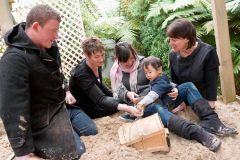Children's drawings have captivated the interest of psychologists for over a century and many have argued that these early depictions can tell us something about their intelligence or emotional wellbeing.
For example, children's drawings of human figures undergo a highly predictable pattern of development, yet the speed with which children progress through these stages varies considerably from child to child. Given these large individual differences, some psychologists have suggested that children's ability to draw human figures may be a reflection of their intelligence and many clinicians and educators have used children's human figure drawings to estimate IQ. While this method of assessment ranks among the top 10 instruments used by professional who work with children, there is little scientific evidence that children's drawings do, in fact, measure intelligence.
In our study, we compared children's scores on a standard drawing test with their scores on a well validated IQ test. We found that drawing was not a good predictor of IQ. Therefore, although children's drawings are inherently fascinating, they should not be used to draw conclusions about their intellectual abilities.




